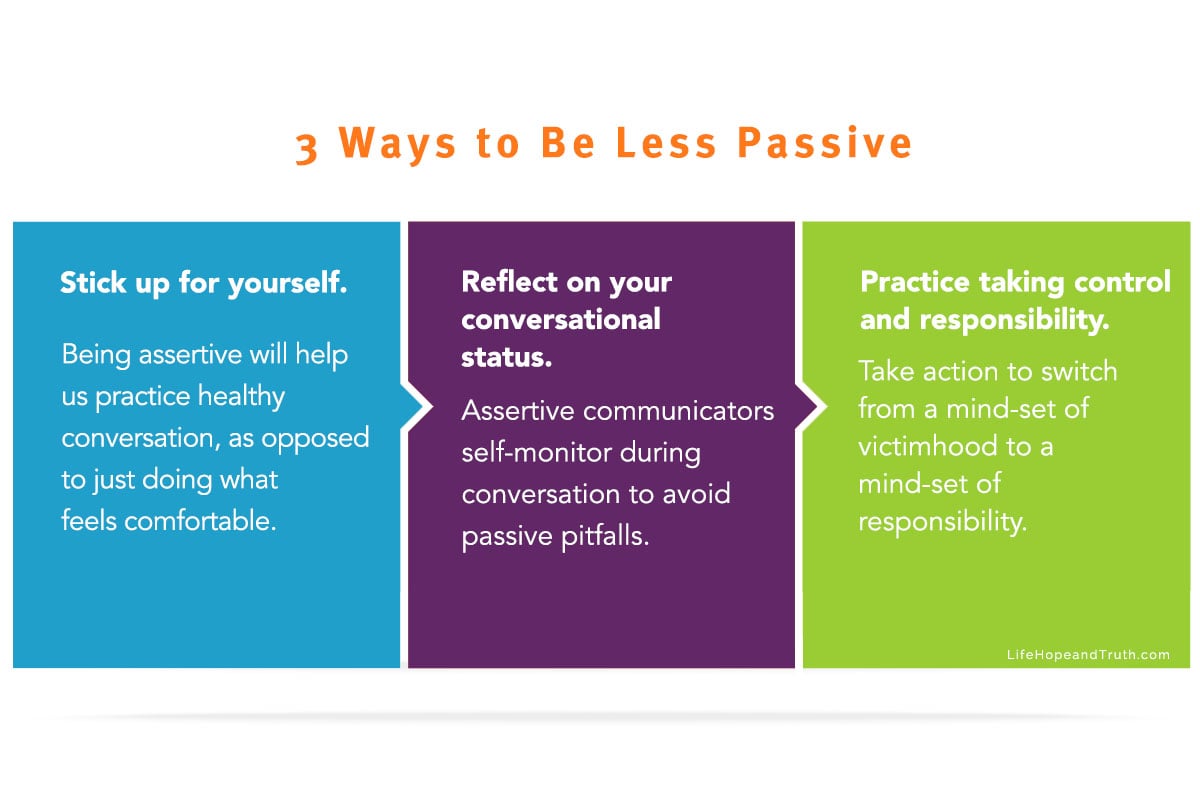Communication Styles: Passive Communication
What is the harm in being a passive communicator? Shouldn’t we all be a little less aggressive and a little bit more willing to listen? Yes and no.
Passive communication is not another term for listening, but is synonymous with checking out or allowing ourselves to be bulldozed over
When thinking of passive communication, what comes to mind? What could be so bad about being passive?
What is passive communication?
Passive communication is the opposite of being assertive. It is when we hide our opinion and feelings and let others “walk all over us.” It is a form of communication that avoids and prolongs issues, instead of dealing with them head-on.
When our style of communication is passive, we are most often seen as pushovers, or powerless, or uninterested.
Passive communication may sound harmless, but when we really understand its dynamics, we learn it truly is harmful. When our style of communication is passive, we are most often seen as pushovers, or powerless, or uninterested.
Make no mistake, there are ebbs and flows in communication in which one must be somewhat passive in order to fully listen to another. But, even then, it’s still essential to use active listening strategies—asking for clarity, letting the other person know you hear what he or she is saying, making adequate eye contact, showing engagement, etc.
Passive communication is not another term for listening, but is synonymous with checking out or allowing ourselves to be bulldozed over (often by more aggressive communicators). This can lead to our getting carried away and swayed by any idea presented (Ephesians 4:14) or not being able to give a clear defense for our beliefs when we need to (1 Peter 3:15).
Passive communication is not indicative of godly humility, but rather of self-degradation, humiliation and a lack of confidence.
Consider some examples of passive thoughts and words in conversation:
- “What he continues to do really bothers me, but I’m not going to say anything.”
- “I guess I should listen to you because you are so much smarter than I am.”
- “Go ahead, my contribution to the conversation wasn’t important anyway.”
- “You’re right, I shouldn’t feel like that. I’m a terrible person.”
- “Here we go again, and there’s nothing I can do about it.”
What are some of the common themes of these thoughts? Passive communication allows others to invalidate our feelings. It allows insults without defense and produces feelings of unworthiness. It allows our thinking to be done for us and can involve checking our brains at the door, negative self-image and apathy.
Are there any benefits to passive communication?
The limited benefits of having a passive communication style are illusory. To others, we may appear to be a good listener, a peacemaker showing humility, and someone who just goes with the flow.
However, the reality is that, inside, we likely feel powerless, harbor resentment and bury and hide our real thoughts and feelings from others. This can ultimately lead to physical and mental health concerns in our lives, because eventually we may either explode or stuff it down and implode.
What are the consequences?
As mentioned above, passive communication can make us feel like we’re perpetually stuck in a trap that prevents us from sharing our thoughts. Also, it encourages others to treat us in aggressive and passive-aggressive ways.
Passive communication trains others to bulldoze over us and treat us disrespectfully.
In other words, as so many counselors will point out, we teach people how to treat us. Passive communication trains others to bulldoze over us and treat us disrespectfully.
We were all created with the potential to be children of God (Romans 8:14, 19).
The Bible tells us that we are to strive to be “peacemakers” (Matthew 5:9). But being a peacemaker does not mean passively allowing others to make war on us. Being walked all over just leads to more tension and division. It also causes others to treat us as inferiors, when we should all view each other as equal before God (Galatians 3:28).
This can lead to hopelessness, resentment, powerlessness and many other negative consequences in our life. Being assertive not only increases the chance of peace, but also helps people who have a tendency to be aggressive learn to communicate in a more healthy way.

How can I be less passive and more assertive?
Here are three ways to become less passive and more assertive:
1. Stick up for yourself in communication situations. If we are naturally passive, this will make our heart race and may have little effect on the other party. But being assertive will help us practice healthy conversation, as opposed to just doing what feels comfortable.
We can (and should!) still try to be assertive with humility, tact and gentleness. This will help others realize that certain communication behavior is not productive in conversations.
Here are some examples of the kind of thinking this requires:
- “That comment had a racist tone. If I smile and nod, then I’m giving conversational agreement that I’m okay with racist comments. I’m not. I need to directly state that I’m not comfortable with that language or the thinking behind it.”
- “He is really laying into me with his words. I need to interrupt him, with my hands up, and tell him that I feel under attack, and I don’t appreciate it at all. He needs to know that either his tone changes now or we can continue the conversation when he is ready to speak to me in a spirit of calm and respect.”
- “I’ve thoroughly researched this matter, and what she is telling us is not true. So as not to embarrass her in front of the others, I will just say I respectfully disagree for now, but later I’ll send her a private message with more details as to why.
2. Reflect on your conversational status often during conversation. To avoid passive pitfalls in conversation, we can self-monitor by asking ourselves questions:
- “Do I really believe what he just said?”
- “Did I enable that person to treat me as an inferior human being?”
- “How much conversational give-and-take is happening?”
- “Did I respectfully and kindly express what I really feel, or just let others think and express their views for me?”
3. Practice taking control and responsibility often, not just during communication. Passive communicators often have an overall mind-set of being powerless in life. But this can change. We can take small steps in our everyday actions to take control of our lives and switch from a mind-set of victimhood to a mind-set of responsibility. Changing our mind-set is the first step toward changing our communication habits.
For example, thinking, “I am responsible for him talking to me like this, because I was not willing to speak up and say that I did not appreciate it.” This mind-set takes ownership of the situation and sets us up to respond more assertively, in the right way at the right time.
Some scriptures to help us overcome being overly passive
- “Therefore, to him who knows to do good and does not do it, to him it is sin” (James 4:17).
-
“For God has not given us a spirit of fear, but of power and of love and of a sound mind” (2 Timothy 1:7).
- “But, speaking the truth in love, may grow up in all things into Him who is the head—Christ” (Ephesians 4:15).
- “Therefore, putting away lying, ‘Let each one of you speak truth with his neighbor,’ for we are members of one another” (Ephesians 4:25).
Passive communication falls short of the gold standard of assertive communication in many important ways, mainly in that it sets up a trap of powerlessness and paints us as a doormat. We may be seen as humble, harmless and great listeners. However, the price we may pay on the inside is not worth the illusion. This is especially true when we know we can strive to be more assertive instead.
Read about assertive communication in part 1 of this series.
Read about aggressive communication in part 3 of this series.
For more insights on communication, read our articles on “The Joys and Challenges of Communication.”
Date Posted: February 3, 2020

 by Eddie and Shannon Foster
by Eddie and Shannon Foster

